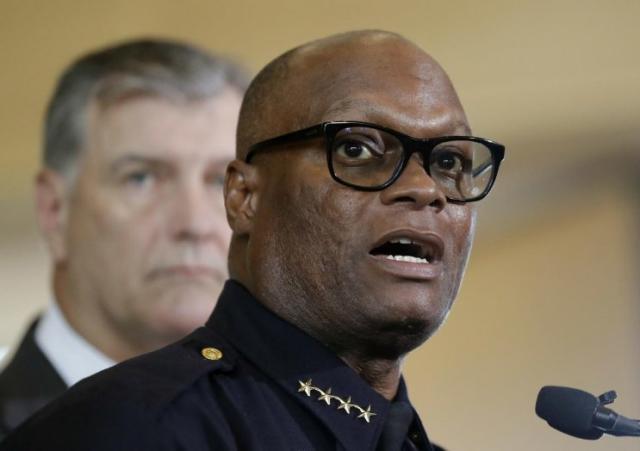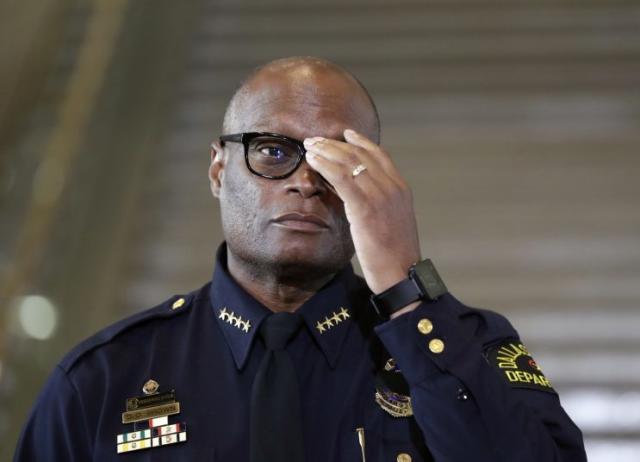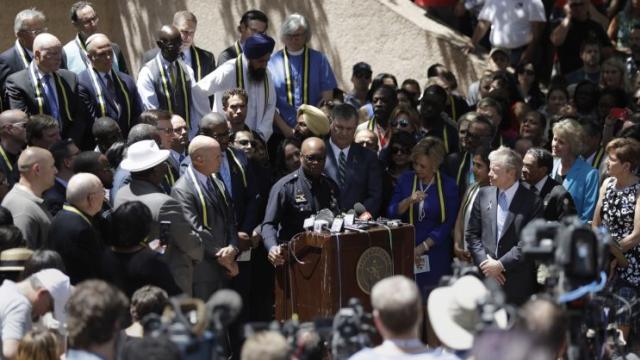
This article is more than
9 year oldDallas Police Chief David Brown, 55, lost his brother to drug violence and his partner in the line of duty. His son killed a police officer and a bystander before being shot dead by a cop himself – right after Brown became chief of police.
The 30-year veteran of the Dallas Police Department was thrust unexpectedly into the spotlight as the U.S. reeled from a tough week that exacerbated long-standing issues.
The deaths of two African-American men at the hands of police officers further strained trust between law enforcement and the communities they serve. And the ambush on cops in Dallas at a Black Lives Matter protest Thursday night pushed the nation deeper into collective pain.
“We’re hurting. Our profession is hurting. Dallas officers are hurting. We are heartbroken. There are no words to describe the atrocity that occurred to our city,” Brown said at a press conference on Friday. “All I know is this must stop: this divisiveness between our police and our citizens.”
Brown spoke from his heart. His style and delivery came across as direct and human rather than dispassionate and canned — expressing in layman’s terms how people were actually feeling. A similar, apparent earnestness has been palpable from other public officials in similar situations, such as Orlando’s mayor last month and Minnesota’s governor earlier this week.

Ed Spencer, a retired longtime Dallas Police Department spokesman, thinks Brown has done an incredible job displaying leadership in the aftermath of the tragedy.
“Really first-class leadership that inspires both the citizens of Dallas and the men and women of the police department,” Spencer said in an interview with Yahoo News. “He’s shown compassion for the officers who were killed and injured, to their families. He’s been forceful in expressing determination to seek and achieve justice. He’s shown pure love both for the police department and the city of Dallas. You just know he cares.”
Spencer said it’s important to note that Brown’s roots run deep in the Dallas community and his family has been in the city for several generations.
Slideshow: Officers killed by sniper in Dallas protest over police shootings
Before Thursday, the deadliest period for the Dallas Police Department occurred in 1988, when five officers died in separate shootings. During that time, Brown responded to the scene of an officer-involved shooting only to find that his old police academy classmate and partner, Walter Williams, had been shot in the head.
In 1991, drug dealers killed Brown’s younger brother, Kelvin, outside Phoenix.
And in 2010, the same year Brown was sworn in as police chief, his son shot and killed a police officer and another man in Lancaster, a suburb of Dallas, before being shot and killed by police officers, the Dallas Morning News reported.

“The past few days have been very troubling and emotional for all of us,” he said in a statement at the time. “My family has not only lost a son, but a fellow police officer and a private citizen lost their lives at the hands of our son. That hurts so deeply I can not adequately express the sadness I feel inside my heart.”
Brown has been proactive in community outreach. Improving relations between his department and the city’s African-American residents was a priority for Brown long before the deaths of Michael Brown in Ferguson, Mo., and Eric Garner on Staten Island, N.Y., thrust the issue to the top of the national conversation.
In August 2014, in the aftermath of the Ferguson shooting, Brown wrote a column for the Dallas Morning News about how he used honesty and restraint to defuse the rising distrust after a white officer shot an unarmed black man in the Dixon Circle neighborhood of Dallas two years earlier.
“One poignant moment during this crisis involved a sergeant who was on the scene. He broke the police line to go into the gathering crowd and console someone he knew among the residents. That sergeant, like me, was born and raised in Dallas and plugged in to the community — in many ways part of the community,” Brown wrote. “That sergeant’s background, and his actions that day, made a big difference.”
The department, Brown said, strived for transparency: sharing the facts as they were known, promising a thorough investigation, answering every question possible from the media and community and so on.
“It does open us up to criticism, threats and exposure of every mistake we make. But it’s the right thing to do,” he wrote.

Small initiatives like “Coffee with Cops” set up occasions where residents can meet and get to know the officers who patrol their neighborhoods and voice any cares or concerns they might have over a free cup of coffee.
“I think he brought the community and the police department closer together, all based on knowing each other and trusting each other,” Spencer said.
But Brown’s larger efforts for reform — such as calling for more gun training, making officers go through racial bias training or firing cops for excessive force against suspects — have landed him in hot water with his own officers, at times.
Last year, for instance, the Dallas Police Association voted to oust him as police chief — citing a 75 percent rise in murders on his watch — but the mayor supported Brown throughout.
Spencer, who worked for seven different police chiefs, said there are times when an incident is so important, so tragic that the public deserves to see and hear from the person in charge. He applauded Brown for not delegating the responsibility of talking to reporters to someone else at this time.
“I don’t know when he slept since this happened. He’s the face and the voice of the police department. You don’t have to go through a filter or a subordinate. He’s done it himself,” Spencer said.
At the Friday press conference, Brown said that Dallas police officers are some of the bravest men and women with whom anyone would ever want to be associated. He said officers can be seen in video after video running toward gunfire from above with little to protect themselves as they bring citizens to safety.
“So please join me in applauding these brave men and women who do this job under great scrutiny, under great vulnerability, who literally risk their lives to protect our democracy,” Brown said. “We don’t feel much support most days. Let’s not make today most days. Please, we need your support.”